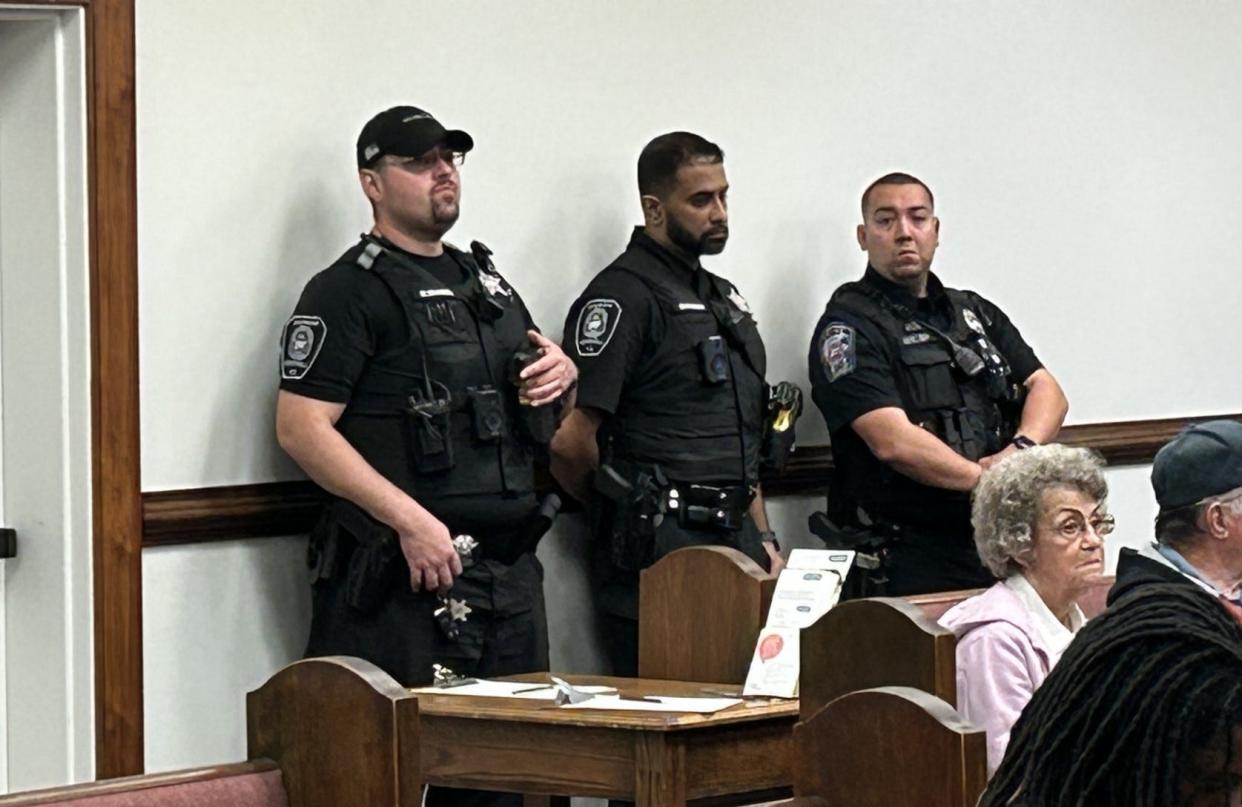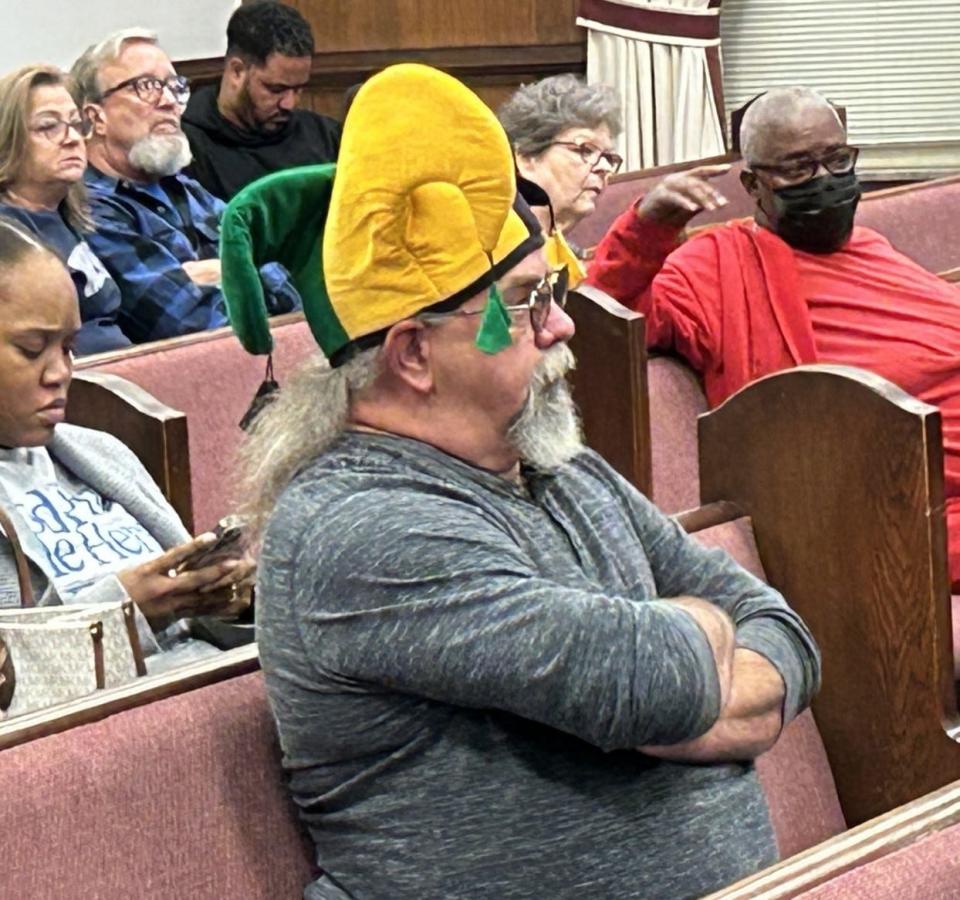Hopewell puts off vote on police collective bargaining

HOPEWELL – It will be mid-November at the earliest before the city decides to officially allow collective bargaining with its public-safety and municipal workers.
Tuesday night, City Council voted 6-1 to hold a work session later this month to fully vet the concept. It was a vote that many citizens who packed the council chambers to “back the badge” as one speaker said did not want to hear.
The reason for the work session? Councilors said they had not been given ample time or data to digest the CB process. A resolution presented to them by the Southern States Police Benevolent Association was basically a template for the city to follow, and some said they were not comfortable voting on something not specifically earmarked for or developed by Hopewell.
“There is a missed opportunity to have this fully explained,” Vice Mayor Jasmine Gore said. “We have to have time to talk.”
Proponents, however, were not buying that. They claimed the issue was broached with council as early as five months ago, which would have given them ample time to ask questions and find out what they needed to know before Tuesday’s hearing, which was the last of two scheduled for the issue.
More: 'Dedication does not pay my bills': Hopewell considers collective bargaining for city workers
Collective bargaining, supporters say, is a way for Hopewell to become more competitive with surrounding localities in retaining police officers. As of Tuesday night, the city was about 15 officers shy of a fully staffed department, and speakers at the public hearing said that shortfall means extended work hours and added stress on the ones still on staff.
Police officers “do a job the majority of us would never want to do,” Robert Sargent told council. Sarah Fuller, who has family in the Marine Corps, said the “semper fi” [“always faithful’} Marine motto applies to the police department.
“Our police are the Marine corps of our city,” she said.
Officer Constance Moreau, secretary of the Hopewell chapter of the Southern States PBA, reiterated positions she stated at the first public hearing Sept. 26 about Hopewell paying $70,000 per officer for training, only to see them leave for other jurisdictions that pay more.
“Congratulations for paying for Prince George and Chesterfield and Colonial Heights to have officers,” Moreau said. She added that most of those who left were dedicated to their city but felt they were being underpaid.
“Please help us want to stay here,” Moreau said.
Proponents say that allowing collective bargaining increases communication between city workers and city administration, and is a proactive strategy for addressing issues before they become official grievances.
Vance Stallings, an attorney working with Hopewell’s chapter of the Southern Police Benevolent Association, repeated many of the same points he made at the Sept. 26 meeting. He noted that the 2020 Virginia General Assembly voted to allow collective bargaining in municipal government, and since then, more than a dozen localities – most of them far larger than Hopewell – have adopted collective bargaining.
Stallings also said city administration would not be giving up any authority to govern if collective bargaining is allowed. He also noted that police personnel are not allowed to strike nor are cities allowed to lock out personnel from doing their jobs.
The timetable offered at Tuesday’s meeting was to have the police department agree on its bargaining unit and bargaining agent first, then to have the city appoint its labor-relations agent by next year. The process would not fully exist until 2025 at the earliest and be part of the city’s annual budgeting by the next fiscal year.
Robert Howard, a retired prison security officer, noted that the federal government allows its security officers to take part in collective bargaining.
“If it’s good enough for the United States, it’s good enough for Hopewell,” Howard said.

Resident Ed Houser said if councilors felt it was worth it to pay “a couple extra dollars” for Hopewell to train officers only to see them go off to other departments, “y’all all need to get from behind those seats up there,”
Several councilors said they were ready to vote to bring collective bargaining to the city, but they acquiesced to their colleagues who wanted to weigh the budgetary pros and cons. Ward 1 Councilor Rita Joyner said the $70,000 for training ‘s “money going down the drain.”
Joyner proposed council holding an Oct. 24 work session to have all concerns addressed, which would put a final vote as early as Nov. 14, council’s one and only regularly scheduled meeting of the month. Gore suggested extending the work session out an additional two weeks, but Joyner and others would not budge.
Ward 7 Councilor Dominic Holloway said the only concerns he had heard about police pay were coming from citizens, not officers, and that Moreau’s appearance at the previous public hearing was the first time he heard anything from officers.
“I know we cannot make everybody happy, but at the same time, I don’t want [the police] thinking about how they are going to pay their bills,” Holloway said. “I just want to make sure we’re doing this the right way.”
Mayor Johnny Partin said he was “ready to vote in favor of this tonight,” but he only agreed to the extension “if it will give this another fighting shot at passage.”
“I want to make sure this comes forward successfully,” Partin said.
Ward 5 Councilor Janice Denton cast the lone vote against having the work session in two weeks, citing unsurety about having everyone’s concerns addressed in such a short period of time. Denton said she called many of the localities who have collective bargaining and was told by all of them that the issue needed to be thoroughly studied because the ordinance presented by the SSPBA was not a one-size-fits-all.
“I don’t think we can do this in two weeks,” Denton said. She also vowed that if all the concerns are not vetted enough in time for a vote on Nov. 14, “I’m going to push like you-know-what not to vote.”
Bill Atkinson (he/him/his) is an award-winning journalist who covers breaking news, government and politics. Reach him at batkinson@progress-index.com or on X (formerly known as Twitter) at @BAtkinson_PI.
This article originally appeared on The Progress-Index: Hopewell puts off vote on police collective bargaining

